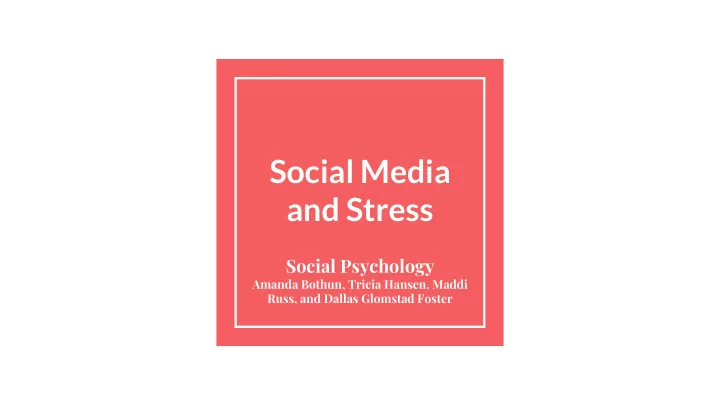

Social Media and Stress Social Psychology Amanda Bothun, Tricia Hansen, Maddi Russ, and Dallas Glomstad Foster
Goal for the Project Investigation ● ○ Effects of social media on self esteem, self perception, and how you view others Why? ● Social media and stress and the impact it has on our society ○ To see if there was an effect on screen time and the variables ○ Social media is taking over how society works as a whole ○
Research: Social media and its relationship with Mood, Self-esteem, and paranoia in Psychosis (Berry, Emsley, Lobban & Bucci, 2018) Researcher have now begun to explore whether social media behaviours ● contribute to psychological outcomes. The study had 44 participants. ○ They used paper-based questionnaires. ○ The study measured self-esteem by using the Rosenberg Self-esteem Scale, which consisted of ○ 10 statements on a 4 point scale. (1=Strongly agree; 4= Strongly disagree) They used Independent t-test to measure self-esteem, paranoid and perceived social ranks ○ between groups. Social media predicted reduction in positive attitudes and elevations in Negative attitudes. ○
Research: #Sleepyteens: Social media use in adolescence is associated with poor sleep quality, anxiety, depression, and low self-esteem (Woods & Scott, 2016) 467 participants ● Scottish ○ 11-17 years of age ○ Had to complete a questionnaire ○ Tried to measure poor sleep quality, anxiety, depression, self-esteem, and ● emotional investment in social media. Correlation ● Poor sleep quality was associated with lower self-esteem. ● Increased anxiety and depression were observed. ● Sleep is linked to both of these. ○ Emotional investment and night time investment predicted poor sleep quality. ●
Our 3 Questions Does using social media change/alter people’s self-perception? ● Does social media usage cause stress? ● Does social usage change how we perceive other people? ● Our Hypothesis: ● We predicted that there would be negative correlation for all 3 questions. People will be more ○ stressed and think less of themselves/others the more screen time they have.
Method: Participants 60 participants ● 23 males ○ 37 females ○ College ● Attending: 25 participants ○ Not Attending: 35 participants ○ Age groups ● 18-28: 36 participants ○ 29-70: 24 participants ○ Recruitment: ● Asked friends and family in person and over the phone ○
Methods: Materials Survey: ● Demographic Questions (4) ○ Age, Student Status, and Gender ■ Questions were on a Likert Type Scale (8) ○ Self Perception, Stress, and Perception of Others. ■ One Free Response (1) ○ Amount of Screen Time ■
Methods: Procedure Had to fill out hard copy of survey. ● Group were no assigned until we got the data. ● Groups were the different age groups ○ 18-28 (Group 1) and 29-70 (Group 2) ■ There was no time limitation ●
Result: Self Perception Question: Does using social media change/alter people's self-perception? ● Type of Test: Correlation ● Questions that Pertained to the research Question: Q2, Q4, Q8, and Q9 ● Questions on Survey P-Value ● Questions that were Significant: Q4 and Q8 ○ Q2 r(60)=-.143 p=.277 ■ Q4 r(60)= -.344 p=.007 ■ Q8 r(60)= -.331 p=.010 ■ Q9 r(60)=-.169 p=.197 ■
Results: Stress Question: Does social media usage cause stress? ● Type of Test: Correlation ● Questions that Pertained to the research Question: Q5, Q6, and Q7 ● Questions on Survey P-Value ● Question that was Significant: Q6 ○ Q5 r(60)= -.135 p=.305 ■ Q6 r(60)= -.287 p=.026 ■ Q7 r(60)= -.033 p=.803 ■
Results: Perception of Others Question: Does social media usage change how we perceive other people? ● Type of Test: Correlation ● Questions that Pertained to the research Question: Q3, Q8, and Q9 ● Questions on Survey P-Value ● Questions that were Significant: Q3 and Q8 ○ Q3 r(60)=-.267 p=.040 ■ Q8 r(60)=-.331 p=.010 ■ Q9 r(60)= -.169 p=.197 ■
Discussion: Hypothesis results: ● The hypothesis turned out to be correct. ○ Negative Correlation between stress, self-perception, and perception of others ■ What our results showed: ● Today’s society revolves around their phones. The more people look at others over social media ○ the more they tend to compare themselves to others. Limitations: ● Time Frame ○ We looked at a population above 18+ ○ People might not know the exact amount of time on social media ○ Our suggestions: ● Online questionnaire (so it’s anonymous) ○ Larger Population with more diversity ○ Equal amount of items for each question ○
Recommend
More recommend